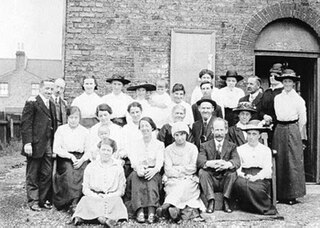
The Plymouth Brethren or Assemblies of brethren are a conservative, low church, non-conformist, evangelical Christian movement whose history can be traced back to Dublin, Ireland, in the late 1820s, where they originated from Anglicanism. The group emphasizes sola scriptura, the belief that the Bible is the supreme authority for church doctrine and practice, over and above any other source of authority. Plymouth Brethren generally see themselves as a network of like-minded free churches, not as a Christian denomination.
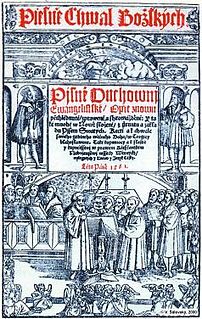
The Unity of the Brethren, also known as the Evangelical Union of Behemian and Moravian Brethren and the Czech Moravian Brethren Church, is a Hussite denomination founded in 1457, whose roots are in the pre-Reformation work of Petr Chelčický and Jan Hus.

The Evangelical Covenant Church (ECC) is a Radical Pietistic denomination in the evangelical Christian tradition. The denomination has more than 875 congregations and an average worship attendance of 280,000 people in the United States and Canada with ministries on five continents. Founded in 1885 by Swedish immigrants, the church is now one of the most rapidly growing and multi-ethnic denominations in North America. Historically Lutheran in theology and background, it is now a broadly evangelical movement.
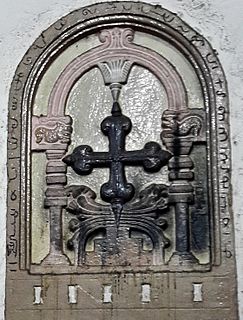
Christianity is India's third-largest religion after Hinduism and Islam, with approximately 28 million followers, constituting 2.3 percent of India's population. According to the tradition of Indian Christians, the Christian faith was introduced to India by Thomas the Apostle, who is said to have reached the Malabar Coast (Kerala) in 52 AD. According to another tradition Bartholomew the Apostle is credited with simultaneously introducing Christianity along the Konkan Coast. There is a general scholarly consensus that Christian communities were firmly established in the Malabar Coast (Kerala) of India by the 6th century AD, which were communities who used Syriac liturgies. Starting from European colonisations from 15th century several Western Christian communities like Latin Rite Catholics and Protestants were created in different parts of the country.

Bakht Singh Chabra also known as Brother Bakht Singh was a Christian evangelist in India and other parts of South Asia. He is often regarded as one of the most well-known Bible teachers and preachers and pioneers of the Indian Church movement and Gospel contextualization. According to Indian traditions, he is also known as 'Elijah of 21st Century' in Christendom. According to his autobiography, Bakht Singh first experienced the love and presence of Jesus when he was an engineering student in Canada in 1929. Even though previously he had torn up the Bible and was strongly opposed to Christianity, he then became a Christian. He was India's foremost evangelist, preacher and indigenous church planter who founded churches and established Hebron Ministries. He began a worldwide indigenous church-planting movement in India that grew to more than 10,000 local churches. Singh died on 17 September 2000, in Hyderabad, India.

The Indian Brethren are a Christian Evangelical premillennial religious movement. Although they have some distinct characteristics, they have a lot in common, in both doctrine and practice, with the international Open Brethren movement, with whom nearly all of them are historically affiliated.
The Indian Pentecostal Church of God (IPC) is the largest Pentecostal organisation in India. It had over ten thousand congregations around the world. Its organisational headquarters is at Hebronpuram, Kumbanad, Kerala, India. Unlike their counterpart, the Assemblies of God, IPC churches stresses on firm evangelical doctrines and forbids new age charismatic movements and strictly condemns word of faith movement and free grace theology (antinomianism). IPC also distances itself from TPM, which according to IPC is a heretical movement. It believes in continuation of spiritual gifts and does not believe in full or partial cessationism.

The Kerala Brethren are a significant subset of the Indian Brethren, who are connected with the Open Brethren movement internationally. In the South Indian State of Kerala, four Syrian Christian (Nasrani) men who came from traditional churches were baptised in 1898, and many of the Kerala Brethren consider this event to have been the start of their movement. Some 600 of the 2,200 Brethren assemblies in India are located in Kerala.
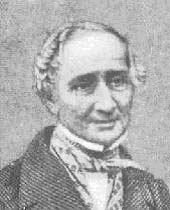
Anthony Norris Groves was an English Protestant missionary and the "father of faith missions". He launched the first Protestant mission to Arabic-speaking Muslims, and settled in Baghdad, now the capital of Iraq, and later in southern India. His ideas influenced a circle of friends who became leaders in the Plymouth Brethren. Among these were JN Darby, JV Parnell, and George Müller, who had married Groves' sister Mary.
The Evangelical Church of North America (ECNA) is a Wesleyan-Holiness, Protestant Christian denomination headquartered in Clackamas, Oregon. As of 2000, the Church had 12,475 members in 133 local churches. The Church sponsors missionaries in seven countries.

The Assemblies of God USA (AG), officially the General Council of the Assemblies of God, is a Pentecostal Christian denomination in the United States founded in 1914 during a meeting of Pentecostal ministers at Hot Springs, Arkansas. It is the U.S. branch of the World Assemblies of God Fellowship, the world's largest Pentecostal body. With a constituency of over 3 million, the Assemblies of God was the ninth largest Christian denomination and the second largest Pentecostal denomination in the United States in 2011.
Protestants in India are a minority and a sub-section of Christians in India and also to a certain extent the Christians in Pakistan before the Partition of India, that adhere to some or all of the doctrines of Protestantism. Protestants in India are a small minority in a predominantly Hindu country, but form majorities in the north-eastern states of Meghalaya, Mizoram, Nagaland and sizeable minorities in Kerala, Tamil Nadu and various east coast and northern states. Protestants today trace their heritage back through a rich history of Christian and monotheistic faith on the Indian subcontinent.

Purasawakkam, also known as Purasaiwakkam or Purasai / Purasawalkam, is a residential cum shopping area in the district of Chennai in the state of Tamil Nadu, India. It is close to the Chennai Central and Chennai Egmore railway stations. Purasawakkam is considered a perfect mixture of commercial and residential hubs.

The United Church of Christ in the Philippines is a Christian denomination in the Philippines. Established in its present form in Malate, Manila, it resulted from the merger of the Evangelical Church of the Philippines, the Philippine Methodist Church, the Disciples of Christ, the United Evangelical Church and several independent congregations.
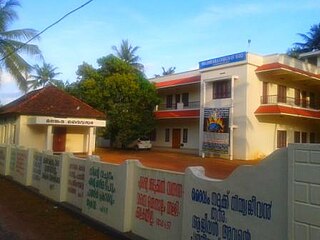
Malankara Church of God Thrikkannamangal is a church in Kottarakkara, Kerala, India, originally known as Malankara Poorna Suvisesha Sabha.
The Christian Brethren Church of New Zealand is the name by which churches in the Open Brethren movement in New Zealand are publicly known. It is not a denomination in the organizational sense, but a loose network of like-minded autonomous local churches, or "assemblies", as Brethren churches are generally known. According to the Evangelical publication, Operation World, there are 202 Brethren congregations in New Zealand with 16,164 in regular attendance. Some Brethren sources claim this number to be an underestimate, with internal surveys indicating as many as 38,000 adults and children attending Brethren assemblies — almost one percent of New Zealand's population.
The Christian Community Churches of Australia are a network of Open Brethren churches, or "assemblies", in Australia. They do not form a denomination in the organizational sense, but rather a network of like-minded autonomous local churches.
The Open Brethren, sometimes called Christian Brethren, are a group of Evangelical Christian churches that arose in the late 1820s as part of the Assembly Movement. They originated in Ireland before spreading throughout the British Isles, and today they have an estimated 26,000 assemblies worldwide.











